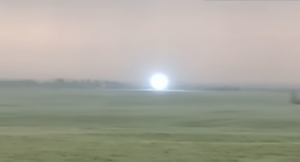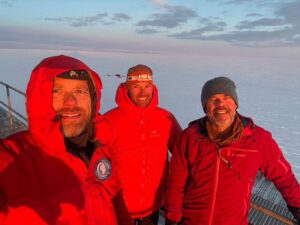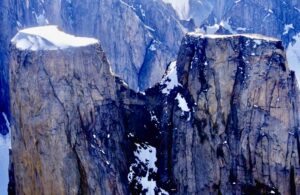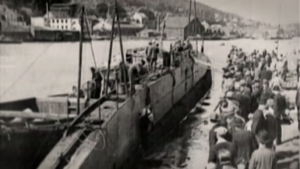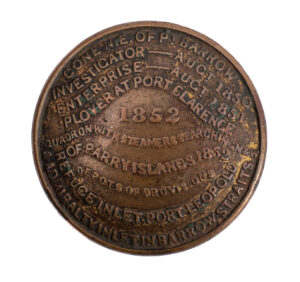Guillaume Moreau, Nicolas Roulx, and Jacob Racine arrived in Gjoa Haven last Thursday and have just left on part three of their mega-journey from northern Ellesmere Island to southern Canada. Next stop: the village of Baker Lake, west of Hudson Bay.
At Gjoa Haven, Jacob Racine left the expedition as planned, and Philippe Voghel-Robert and Etienne Desbois joined Moreau and Roulx for this next phase. The foursome has also swapped sleds for canoes, although they will be hauling their canoes like sleds for some time yet.

Water, water everywhere, but not a drop to paddle. The four leave Gjoa Haven for the still-frozen rivers of mainland Nunavut. Photo: Expedition AKOR
After covering the 800km from the Eureka weather station on Ellesmere Island to Resolute, the trio had to reevaluate their route to Gjoa Haven. Barrow Strait, the channel between Cornwallis Island, on which Resolute sits, and Somerset Island, had broken up. It was now mainly open water. Rather than risk the crossing, they chartered a plane to fly them 80km over the gap to safe ice by Somerset Island. Speaking from Gjoa Haven, Moreau believes they made the right decision:
“Barrow Strait would have been impossible without a boat,” said Moreau. “We couldn’t swim 10km with so much gear, and our boats were in Gjoa and [it would have taken] too long to be loaded into a plane.”

Moreau, Roulx, and Racine ready to ski to Gjoa Haven after their unscheduled plane ride. Photo: Expedition AKOR
After hopping over the 80km, Moreau, Roulx, and Racine had another 600km to ski. They started gently, with 20km days, as they shook off the rust from their rest stop in Resolute. For Moreau, it was also important to test his knee, which had been sore from the strain of hauling. Fortunately, the time off in Resolute was sufficient to recover.
“We are feeling much better,” said Moreau. “We feel the fatigue, the accumulation of kilometres. But we have no major injuries and no open wounds. However, we are not flexible, we are stiff like baseball bats!”
Skiing inside a ping-pong ball
After a couple of days, they cranked up the pace. The spring ice was much better than further north, offering superior glide and allowing for some 30km days. While the ice was good, the weather was fairly poor. For 18 of their 24 days, they skied “inside the ping-pong ball” with zero visibility. It was a slog and hard to stay motivated.
Arriving on King William Island was a huge relief. Here, they saw caribou and birds and enjoyed their first balmy days of the year. At times, the mercury reached 10°C to 12°C in the sunshine. The ice reflected the heat and it “felt like we were in a toaster,” Moreau said.

The weather improved as they approached King William Island. Photo: Expedition AKOR
They arrived in Gjoa Haven after 24 days and 600km, at an average of 25km per day.
Now their mode of transportation switches, at least theoretically, to canoes. Northern rivers typically thaw in mid-June. But satellite images suggest that they are all still frozen. The team will need to pull their canoes for over a week over the sea ice before reaching the inland waterways of mainland Canada. They hope that by then, the spring melt will have started.

The team will need to drag their canoes for 80km to the Canadian mainland. As spring advances, leads, or cracks in the sea ice, form and widen. Photo: Expedition AKOR
Too early?
But it may be too early. Skiing on the Back River right before breakup would be too dangerous, so they may be forced to trek further west. This detour would take them further inland to a chain of lakes. The lakes are safer to ski over because they wouldn’t have to worry about currents and moving ice.
This section of their 7,600km journey may prove the most dangerous. Moreau says that it is the most challenging paddle that these experienced canoeists have ever undertaken.
But they are confident. Moreau calls it an aquatic mindset. They know their limits and it is easy to improvise their route, portaging their canoes where necessary.
They left Gjoa Haven for Baker Lake yesterday. The distance is about 500km as the crow flies, but 650km as the canoeist wanders.

The black line marks their route so far.

Stage three: Gjoa Haven to Baker Lake.

